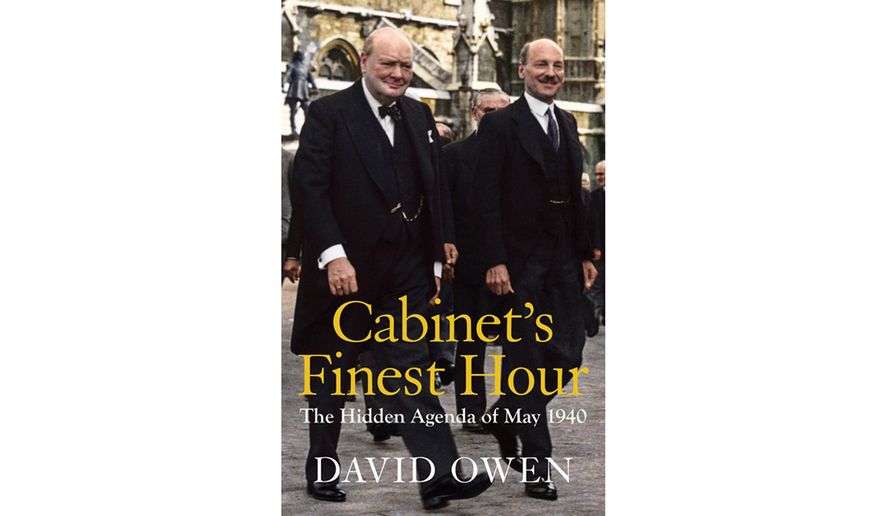
David Owen has had one of the most protean careers of any British politician. A medical doctor by training, specializing in neurology, he went on to become a member of the British Parliament, becoming foreign secretary in 1977 while still in his late 30s in Prime Minister James Callaghan’s government. After Margaret Thatcher’s victory, he was one of the “Gang of Four” MPs who left the leftward-lurching Labor Party to found the Social Democratic Party (SDP). And he still sits in the House of Lords as an “independent social democrat.”
Amid all this political work, Lord Owen has found time to write many books, and with this latest, he provides an in-depth look at the pivotal decisions taken by Britain’s War Cabinet in the month that saw Winston Churchill become prime minister. As someone who has himself sat in the inner circles of political power at No. 10 Downing Street, he brings a unique perspective to how such groups operate, something which resonates on every page here.
Mr. Owen’s experience has taught him the value of the original documents available to those actually making choices while deciding policy directions and has been able to draw upon papers “once only available to members of Churchill’s War Cabinet.” As he writes in the preface to “Cabinet’s Finest Hour”:
SPONSORED CONTENT
 Marriott Brings Back NFL ExperiencesGlobal Traveler Magazine
Marriott Brings Back NFL ExperiencesGlobal Traveler Magazine NBA Player J.J. Redick Lands a Brooklyn Penthouse for $4.25 MillionMansion Global
NBA Player J.J. Redick Lands a Brooklyn Penthouse for $4.25 MillionMansion Global The most addictive game of the year!Forge Of Empires
The most addictive game of the year!Forge Of EmpiresRecommended by
“I attach much importance to making available to the reader original documents from the time. I have tried to select sufficient quotes so that the narrative is not dependent on reading the documents in full.”
The author’s capacity for serving up such copious, judicious selections is just one of the qualities that make his tale so fascinating and absorbing.
Churchill has long been given credit for his staunch resolve to fighting on alone against Nazi Germany in the wake of its shocking Blitzkrieg and unexpected defeat of Britain’s main ally, France. But before John Lukacs published at the turn of this century his fresh look at the weeks following Churchill’s ascent to power, few were aware of how very nearly the great man was derailed from his task by the small, powerful, inner War Cabinet he had himself appointed. It is a measure of Mr. Owen’s scrupulousness as a historian as well as his graciousness and generosity that he acknowledges being “deeply indebted to John Lukacs’ ground-breaking book “Five Days in London, May 1940,” even if he does not agree with everything in it.
What Mr. Lukacs centrally shone a spotlight on was Foreign Secretary Lord Halifax’s dogged determination still to achieve a negotiated settlement with Hitler through his cohort Mussolini, who had not yet entered the war against Britain and France. Although there is the inevitable thought that Halifax, who had been passed over in favor of Churchill, was seeking to gain what many thought was his rightful position, it seems clear that he was sincere, if misguided, in his determination still to pursue peace at any price as he had done alongside Prime Minister Neville Chamberlain in 1938.
The Labor War Cabinet members, whose party had refused to serve under Halifax, unsurprisingly supported Churchill. So it came down to which side Chamberlain would support. Hitler’s takeover of what remained of Czechoslovakia only months after his promise to Chamberlain at Munich that their agreement was the end of his territorial ambitions in Europe had caused the scales to fall from the prime minister’s eyes. His attitude of “fool me once, shame on you, fool me twice, shame on me” had only grown with Hitler’s multiple betrayals. And so, in the end, he sided with Churchill’s desire for vigorous warfare to be waged against all odds. No wonder that when people questioned Churchill’s handsome tribute to Chamberlain after his death only months later and he claimed it was easy, it was probably those days in May which made it so.
What is fascinating to see is the patience with which the normally impetuous Churchill allowed Halifax to pursue his arguments and even try some speculative attempts at negotiation. By giving him such full rein, the War Cabinet — and eventually even the foreign secretary himself — was able to see for themselves just how futile such a strategy was. Anyone who only associates Churchill with his undoubtedly great qualities of defiance and resolution will see a very different side in what Mr. Owen has provided readers.
Mr. Owen states forthrightly that “I do not think this book would have been possible without this Cabinet experience. As the years pass I grow evermore convinced that collective decision-making is the hallmark of a true democracy … . Also that there is nothing old-fashioned about its mechanisms that are proven to work.” It is the prime achievement of this authoritative book that it shows how Churchill was able to harness the forces of collective decision-making in order to fight off a last fatal attempt at appeasement and give himself the mandate necessary for ultimately victorious prosecution of the war. This is an important, instructive and ever-timely testament to a master politician literally saving his nation — and mankind — from catastrophe.
No comments:
Post a Comment